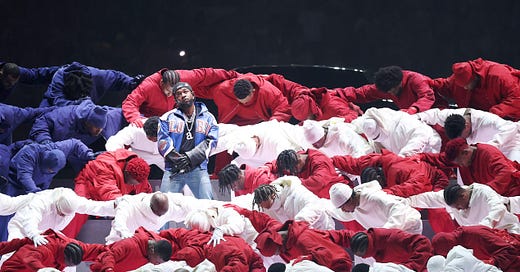Super Bowl LIX: The Night of Indulgence, Contradictions, and a Message Most People Missed
The Super Bowl isn’t just about football—it’s about excess. A national event where we eat, drink, and consume commercials with the same intensity as the game itself. And as always, brands were ready to cash in on the contradictions.
One minute, you're elbow-deep in queso, fully committed to the binge. The next, Hims & Hers is hitting you with a weight loss drug ad, subtly reminding you that maybe you should feel bad about it.
It’s the same cycle every year:
🍕 Eat everything in sight!
💉 Here’s a prescription to "fix" it.
But Hims & Hers wasn’t the only brand trying to play both sides.
Lay’s aired an ad painting their chips as wholesome, farm-fresh goodness. Reality? They’re highly processed, scientifically engineered for addiction, and nowhere near the idyllic fields they want you to picture.
Cetaphil launched their “We’re All a Lil Sensitive” campaign, branding themselves as the champion of delicate skin—while still being criticized for using ingredients that some dermatologists say aren’t great for sensitive skin.
This is the marketing formula:
🥔 "Our product is pure and wholesome!" (Never mind the processing.)
🧴 "We’re here for sensitive skin!" (Ignore the ingredient controversy.)
Then Kendrick Lamar Took the Stage.
While brands were either selling indulgence or selling the antidote to it, Kendrick Lamar did something rare: he used the most corporate, commercialized event in America to send a message about who truly shapes this country—and who gets erased from the narrative.
Kendrick’s Message About America
Samuel L. Jackson as Uncle Sam? Not just a gimmick—a direct challenge to who defines patriotism. For decades, America’s national identity has been shaped by who gets to tell the story. Kendrick flipped that on its head by casting a powerful Black cultural figure in the role of America’s most famous symbol. It was a visual statement: Black people are America, too.
The American flag made up of Black performers? A direct acknowledgment that Black labor, Black culture, and Black resilience built this country—but are often left out of its successes. It was a reminder that while brands and corporations profit off Black culture (think: every major ad using hip-hop aesthetics to sell products), the actual people behind it rarely get the full credit they deserve.
The phrase "Revolution is about to be televised" woven into the performance? A callback to Gil Scott-Heron’s “The Revolution Will Not Be Televised,” a poem about how real change isn’t manufactured for mass consumption.
Kendrick was telling us: you’re watching history unfold, but are you really paying attention?
And as all of this was unfolding, Donald Trump—one of the most divisive, and reactionary figures in modern American politics—was sitting in the audience, watching.
The same man who:
🚫 Called NFL players sons of b*****s for kneeling in protest.
🚫 Mocked movements for racial justice.
🚫 Turned every conversation about race into a personal grievance.
And now, there he was—watching a halftime show that directly challenged everything he stands for.
Did he get the message? Unlikely. But half the country watching at home sure did—and they were cringing for an entirely different reason.
Kendrick vs. Drake: A Battle That’s Bigger Than Hip-Hop
Beyond the political symbolism, this Super Bowl performance was another move in the chess match between Kendrick and Drake—a rivalry that is about far more than just rap.
Drake is the biggest commercial force in hip-hop, a master of playing the industry game, dominating charts, and shaping pop culture with pure volume. His music is everywhere, carefully calculated to be algorithm-friendly, mass-appeal, and unmissable.
Kendrick, on the other hand, doesn’t flood the market—he waits, he crafts, he delivers when it matters. And Not Like Us wasn’t just a diss track—it was a public dismantling of Drake’s entire image.
Accusing Drake of being a predator in “Not Like Us” was a strategic nuke, not just a lyrical jab. Instead of simply calling him out on generic rap beef, Kendrick attached a stigma that no brand, no amount of PR, and no algorithm can wash away.
Drake was so rattled he filed a defamation lawsuit against Universal Music Group. That’s never happened in a rap battle of this magnitude. The fact that he took legal action proves just how deeply the accusations hit.
So when Kendrick teased Not Like Us at the Super Bowl, he wasn’t just flexing—he was controlling the narrative.
🔥 He taunted the audience, saying, "I wanna perform they favorite song, but you know they love to sue."
🔥 He made people wait, letting the tension build.
🔥 Then, finally, he dropped just enough of the track to remind everyone: the battle isn’t over.
Kendrick didn’t just take on Drake—he exposed him. And the way he’s playing it, he doesn’t even need to say Drake’s name anymore. The damage is done.
Kendrick Lamar’s #SuperBowl2025 halftime show wasn’t just entertainment—it was a filled with symbolism and social commentary. 🎤🔥 As @Blabbertok from Tiktok pointed out, the performance had deeper meanings about unity, control, and resistance.
From the game controller imagery at the start to Samuel L. Jackson’s ‘Uncle Sam’ nod, every detail was intentional. Some viewers dismissed it as ‘boring’ or ‘mid,’ but those who listened heard the message clearly.
The overwhelming response in the comments says it all: ‘Art has always played a critical role in political resistance,’ ‘This was a call to action,’ and ‘The more I watch, the more I see.’ Kendrick knew exactly what he was doing.
The Bigger Picture: America Loves the Show, But Hates the Truth
Super Bowl LIX was a perfect reflection of America:
The ads were loud, overproduced, and filled with contradictions.
Brands were selling indulgence, then selling guilt.
And Kendrick Lamar was the only one actually saying something real.
Most of America will remember the funny commercials. Few will understand what Kendrick was really doing.
And that’s exactly the problem.



